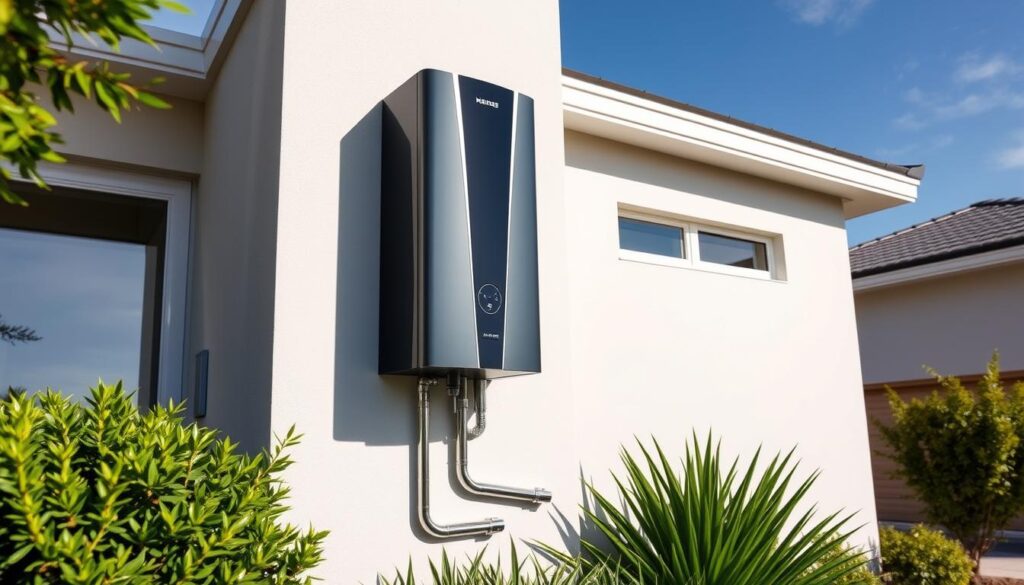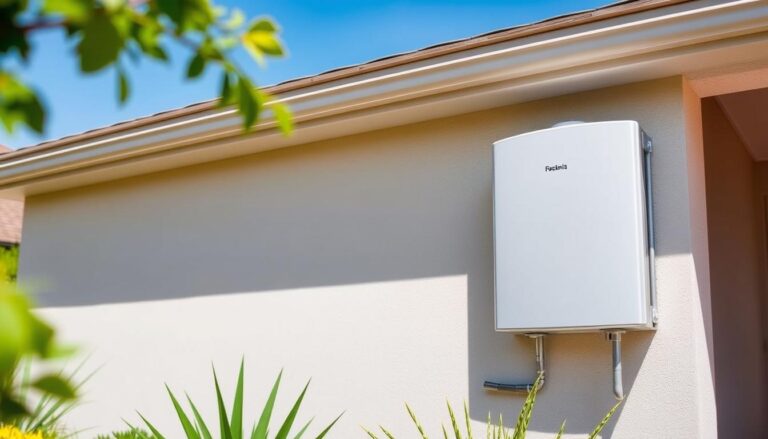An exterior tankless water heater is a smart choice for endless hot water and saving energy. It’s a compact system that heats water only when you need it. This makes it perfect for those wanting to save space and cut down on energy costs.
Choosing a tankless water heater is a wise move for homeowners. It’s a reliable and efficient way to heat water. An exterior model uses the latest tech for better energy use, leading to lower bills and less environmental impact. If you’re updating or installing a new system, consider an exterior tankless water heater.
Understanding Exterior Tankless Water Heater
Exterior tankless water heaters are a smart choice for those wanting to save space and cut down on energy use. They use tankless technology to keep the water flowing hot, unlike traditional tank-style heaters.
Installing them outside has many perks, like less chance of water damage and more safety. It also frees up space inside, which is great for homes with little room for a big water heater.
Some big pluses of exterior tankless water heaters are:
- They’re energy-smart: Only heating water when you need it, which saves energy and money.
- They save space: Their compact design and outside installation are perfect for small homes.
- They give endless hot water: No worries about running out of hot water with tankless tech.
Understanding tankless technology and the benefits of exterior installation is key. This way, homeowners can make a smart choice and enjoy the benefits of these systems.

With proper installation and care, exterior tankless water heaters can last for many years. They also help reduce your environmental impact.
Energy Efficiency and Cost Savings
Exterior tankless water heaters are made to be energy efficient and save homeowners money. They only heat water when needed, cutting down on standby heat loss. This is a big problem with traditional tank-style water heaters.
By using less energy, these systems help homeowners save on their bills. This makes them a smart choice for anyone wanting to cut down on energy use.
Switching to a tankless water heater can lead to big cost savings. Studies show homeowners can save up to $100 a year. This is because tankless heaters only use energy when you need hot water. Traditional tank heaters, on the other hand, constantly heat and reheat water, even when not in use.
Some key benefits of exterior tankless water heaters include:
- Reduced energy consumption
- Lower energy bills
- Increased energy efficiency
- Longer system lifespan
Overall, exterior tankless water heaters are a reliable and efficient way to get hot water. They use less energy and help save money. Their advanced technology and eco-friendly design make them a popular choice for homeowners.
Choosing an exterior tankless water heater brings many benefits. Homeowners get energy efficiency and cost savings while also helping the environment. With the right system, you can save money, use less energy, and always have hot water.
| System Type | Energy Efficiency | Cost Savings |
|---|---|---|
| Tankless Water Heater | High | Up to $100 per year |
| Traditional Tank-Style Water Heater | Lower | None |
Choosing the Right Exterior Tankless Water Heater
Choosing an exterior tankless water heater involves several key factors. The size and capacity are essential to ensure hot water is always available. The fuel type also affects efficiency and cost.
These heaters can run on natural gas, propane, or electricity. Natural gas is popular for its efficiency and lower costs. Electric models are better for the environment and need less upkeep.
Size and Capacity Considerations
To find the right size, think about your household’s hot water needs. A bigger family needs a more powerful heater. Consider these factors:
- Number of bathrooms and showers
- Number of people in the household
- How often you use hot water
Fuel Type Options
Fuel type is crucial when picking a heater. Natural gas heaters are more efficient but electric ones are better for the planet and easier to maintain.
By carefully choosing, you can get hot water when you need it. This also helps cut down on energy bills and environmental harm.
Professional Installation Requirements
Installing an exterior tankless water heater needs professional installation to work well and safely. Bad installation can cause gas leaks, electrical shocks, and lower system performance. It’s key to hire a skilled installer who knows the installation requirements for your system.
A pro will check your home’s plumbing and electrical systems to find the best setup. They’ll make sure the tankless water heater is vented right, connected to the right gas supply, and follows local building rules. Getting professional installation means you get to enjoy your system without worrying about expensive fixes.
To find a good installer, look for those with experience in exterior tankless water heaters. Ask friends, family, or neighbors for recommendations. Also, check online reviews to see if the installer is reputable and meets your installation requirements. Choosing a pro ensures your system is installed safely and efficiently.
Important things to think about for professional installation include:
- Checking your home’s plumbing and electrical systems
- Ensuring proper venting and gas supply connections
- Meeting local building codes and regulations
- Providing maintenance and repair support
By focusing on professional installation and following these tips, you can enjoy your exterior tankless water heater. This way, you avoid risks and save money.
Maintenance and Care Tips
Keeping your exterior tankless water heater in good shape is key. A regular maintenance schedule can stop common problems and save you money on repairs.
Issues like scale buildup, corrosion, and frozen pipes can happen. To avoid these, do routine checks like descaling, looking for corrosion signs, and winterizing to protect against cold.
Regular Maintenance Tasks
- Check the temperature and pressure relief valve to ensure it is functioning properly
- Inspect the system for signs of corrosion or damage
- Perform descaling to remove mineral deposits
Winterization Steps
To winterize your exterior tankless water heater, follow these steps:
| Step | Description |
|---|---|
| 1 | Turn off the power to the system |
| 2 | Drain the system to prevent water from freezing in the pipes |
| 3 | Insulate the pipes to protect them from freezing temperatures |
By following these tips, your exterior tankless water heater will work better. You’ll get hot water all year without issues.
Comparing Costs: Installation and Long-term Value
Thinking about getting an exterior tankless water heater? It’s key to look at the upfront cost and the long-term benefits. The price to install one can change based on size, brand, and features.
Exterior tankless water heaters save money over time by using less energy. This means lower utility bills for homeowners. To figure out if it’s worth it, compare the initial cost, ongoing expenses, and savings. Comparing costs and looking at long-term value helps homeowners choose wisely.
Initial Investment Analysis
The cost to start includes the unit’s price, installation, and any extra features. It’s important to think about these costs when looking at different models and brands.
Operating Cost Breakdown
Operating costs include energy use, upkeep, and repairs. By looking at these, homeowners can see the investment’s long-term worth. This helps them decide on their water heating needs.
Return on Investment Timeline
Homeowners will see savings over time with an exterior tankless water heater. They’ll spend less on utilities and use less energy. By comparing costs and looking at long-term value, homeowners can make a smart choice. They’ll enjoy the benefits of their investment, including lower installation costs and long-term savings.
Exterior tankless water heater: Environmental Impact and Sustainability Features
Exterior tankless water heaters are good for the environment. They use less energy and waste less water. This makes them better than traditional tank-style water heaters.
Some key benefits of exterior tankless water heaters include:
- Lower energy consumption, resulting in reduced greenhouse gas emissions
- Longer lifespan, typically lasting 15-20 years or more, compared to traditional tank-style water heaters
- Reduced risk of water damage and leaks, as they do not store water
When looking at the environmental impact of a tankless water heater, consider its sustainability features. Some models are made from recyclable materials. They are also more compact, which reduces waste and carbon footprint. Choosing such a model helps homeowners support a sustainable future.
In conclusion, exterior tankless water heaters have many sustainability features. They help reduce their environmental impact. By understanding these benefits, homeowners can make a choice that supports a sustainable future.
Conclusion: Making the Switch to an Exterior Tankless Water Heater
Exterior tankless water heaters are a great solution for your home’s hot water needs. They give you endless hot water when you need it and save energy. This means you’ll save money in the long run.
Switching to an exterior tankless water heater is a smart move. It’s compact, saves space, and is good for the environment. If you’re building a new home or need a new water heater, consider this option. It’s reliable, easy to maintain, and eco-friendly.
Start your journey to a more efficient hot water system today. Look into the different options and make the switch to an exterior tankless water heater.
FAQ’s About Exterior tankless water heater
What is an exterior tankless water heater?
An exterior tankless water heater is a small, energy-saving system. It’s installed outside, usually on a wall or in a special box. It heats water as you need it, giving you hot water without a big tank.
How do exterior tankless water heaters work?
These heaters use new tech to heat water only when you need it. When you turn on a hot water tap, cold water flows in. It’s then quickly warmed up by gas or electricity before reaching your tap.
What are the benefits of installing an exterior tankless water heater?
These heaters offer endless hot water, save energy, and take up less space. They also handle bad weather well, making them a solid choice for homes.
How energy-efficient are exterior tankless water heaters?
They’re very energy-efficient because they only heat water when needed. This cuts down on energy waste and can save you money on bills over time.
What factors should I consider when choosing an exterior tankless water heater?
Look at the system’s size, fuel type (gas, propane, or electricity), and how it fits your local climate. Pick one that matches your household’s hot water needs.
Is professional installation required for an exterior tankless water heater?
Yes, getting a pro to install it is a must. They know how to connect it right, ensuring it works safely and efficiently. DIY can be dangerous and might void the warranty.
How do I maintain and care for an exterior tankless water heater?
Keeping it in good shape is key. Clean it regularly, replace filters, and have a pro check it out now and then. Don’t forget to winterize it to avoid damage from cold.


